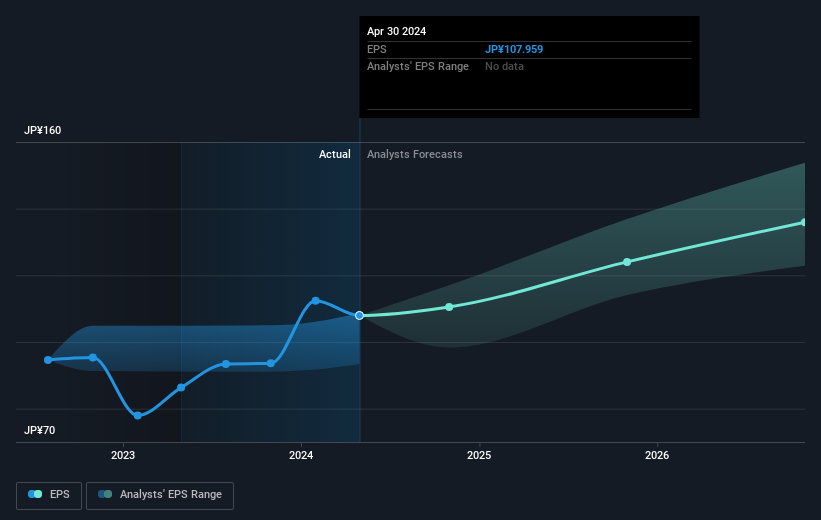- Japan
- /
- Food and Staples Retail
- /
- TSE:3038
Kobe Bussan's (TSE:3038) five-year earnings growth trails the impressive shareholder returns

The most you can lose on any stock (assuming you don't use leverage) is 100% of your money. But on the bright side, if you buy shares in a high quality company at the right price, you can gain well over 100%. One great example is Kobe Bussan Co., Ltd. (TSE:3038) which saw its share price drive 268% higher over five years. On top of that, the share price is up 29% in about a quarter.
Since the stock has added JP¥47b to its market cap in the past week alone, let's see if underlying performance has been driving long-term returns.
Check out our latest analysis for Kobe Bussan
While the efficient markets hypothesis continues to be taught by some, it has been proven that markets are over-reactive dynamic systems, and investors are not always rational. One flawed but reasonable way to assess how sentiment around a company has changed is to compare the earnings per share (EPS) with the share price.
During five years of share price growth, Kobe Bussan achieved compound earnings per share (EPS) growth of 15% per year. This EPS growth is lower than the 30% average annual increase in the share price. So it's fair to assume the market has a higher opinion of the business than it did five years ago. That's not necessarily surprising considering the five-year track record of earnings growth.
The company's earnings per share (over time) is depicted in the image below (click to see the exact numbers).

We know that Kobe Bussan has improved its bottom line lately, but is it going to grow revenue? You could check out this free report showing analyst revenue forecasts.
What About Dividends?
It is important to consider the total shareholder return, as well as the share price return, for any given stock. Whereas the share price return only reflects the change in the share price, the TSR includes the value of dividends (assuming they were reinvested) and the benefit of any discounted capital raising or spin-off. It's fair to say that the TSR gives a more complete picture for stocks that pay a dividend. We note that for Kobe Bussan the TSR over the last 5 years was 279%, which is better than the share price return mentioned above. The dividends paid by the company have thusly boosted the total shareholder return.
A Different Perspective
We're pleased to report that Kobe Bussan shareholders have received a total shareholder return of 27% over one year. Of course, that includes the dividend. However, that falls short of the 31% TSR per annum it has made for shareholders, each year, over five years. Before forming an opinion on Kobe Bussan you might want to consider these 3 valuation metrics.
But note: Kobe Bussan may not be the best stock to buy. So take a peek at this free list of interesting companies with past earnings growth (and further growth forecast).
Please note, the market returns quoted in this article reflect the market weighted average returns of stocks that currently trade on Japanese exchanges.
Valuation is complex, but we're here to simplify it.
Discover if Kobe Bussan might be undervalued or overvalued with our detailed analysis, featuring fair value estimates, potential risks, dividends, insider trades, and its financial condition.
Access Free AnalysisHave feedback on this article? Concerned about the content? Get in touch with us directly. Alternatively, email editorial-team (at) simplywallst.com.
This article by Simply Wall St is general in nature. We provide commentary based on historical data and analyst forecasts only using an unbiased methodology and our articles are not intended to be financial advice. It does not constitute a recommendation to buy or sell any stock, and does not take account of your objectives, or your financial situation. We aim to bring you long-term focused analysis driven by fundamental data. Note that our analysis may not factor in the latest price-sensitive company announcements or qualitative material. Simply Wall St has no position in any stocks mentioned.
About TSE:3038
Kobe Bussan
Primarily engages in the operation, management, and franchising of retail stores in Japan.
Flawless balance sheet with moderate growth potential.


